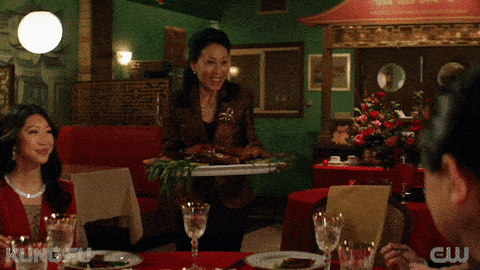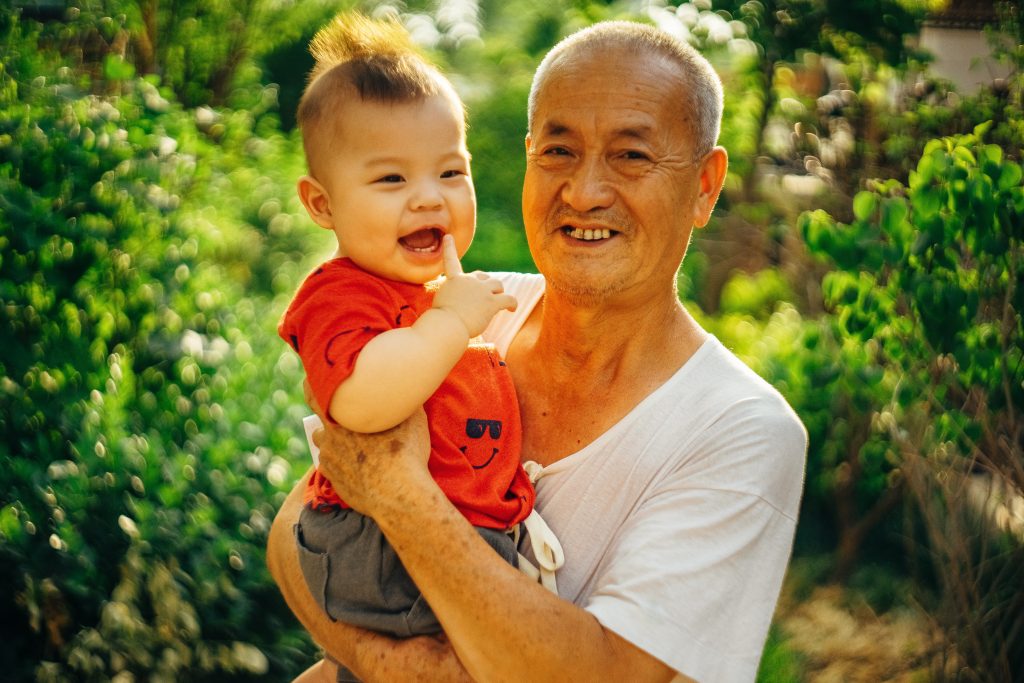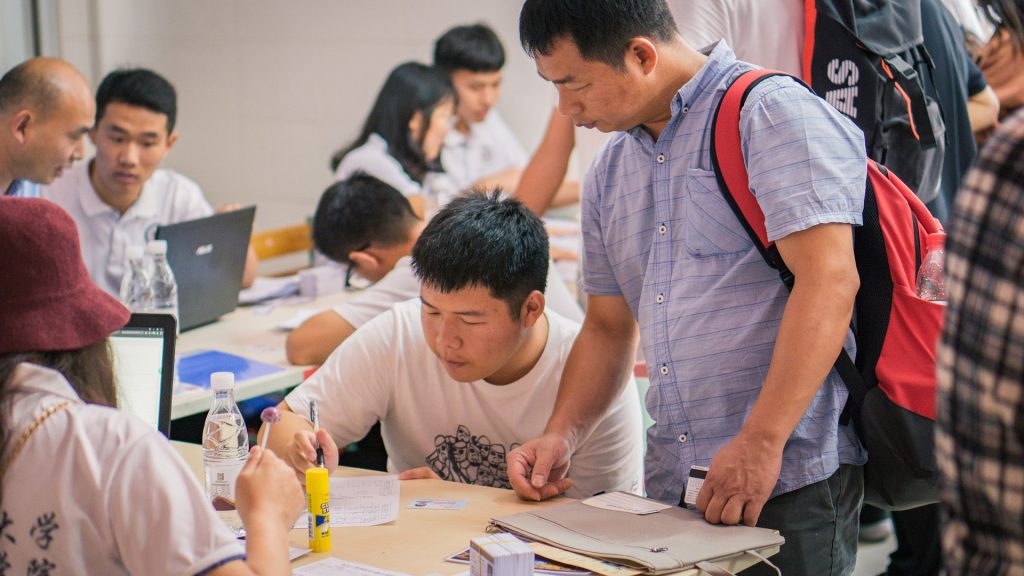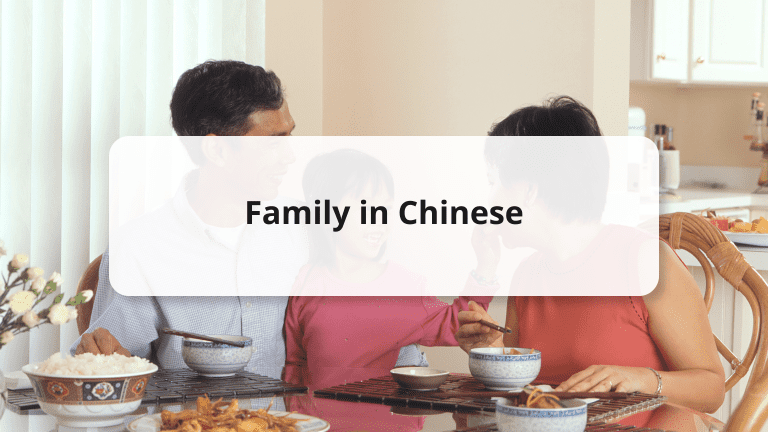We’ll explore the cultural aspects of the family in Chinese culture, including the meaning of filial piety and how to address different family members in Mandarin Chinese. We’ll also delve into the cultural values and customs related to the family in Chinese society. Let’s begin!

Learn the Word “Family” in Mandarin
The word “family” in Mandarin is “jiā” (家), which has a variety of meanings and connotations.
The character “家” is comprised of two parts: the roof radical (宀) and the pig radical (豕). This symbolizes the traditional Chinese understanding of the family as a shelter and source of sustenance. In ancient times, the family was a crucial unit of society, with the father as the head and provider and the mother as the caregiver and homemaker.
But the meaning of “家” goes beyond just a group of people living under the same roof. It also encompasses a sense of belonging, loyalty, and shared identity. In Chinese culture, the family is seen as the foundation of an individual’s personal and social relationships. It is where one learns values, morals, and customs, and where one can find support and protection.

What is Filial Piety?
Filial piety, or xiào (孝) in Mandarin Chinese, is a core value in traditional Chinese family culture that emphasizes respect, obedience, and loyalty to one’s parents and ancestors. It is believed that demonstrating filial piety brings blessings and good fortune to the family and ensures the continuation of the family line. In modern times, filial piety remains an important value in Chinese family culture, although its expression may vary.
Filial piety is not just limited to one’s parents, but also extends to one’s ancestors. It is traditional to pay respects to one’s ancestors through rituals and offerings, such as visiting their graves and participating in ancestor worship.
Some people may choose to demonstrate filial piety through more practical means, such as providing financial support or caring for their aging parents. Regardless of the form it takes, filial piety is seen as a way to maintain harmony and strengthen relationships within the family in Chinese culture.

Addressing Family Members in Mandarin Chinese
In Mandarin Chinese, there are specific terms for addressing different family members. Here is a chart with the English, Traditional Chinese, Simplified Chinese, and pinyin for various family members:
| English | Simplified Chinese | Traditional Chinese | Pinyin |
|---|---|---|---|
| Father | 父亲 | 父親 | fù qīn |
| Mother | 母亲 | 母親 | mǔ qīn |
| Older brother | 哥哥 | 哥哥 | gē ge |
| Younger brother | 弟弟 | 弟弟 | dì di |
| Older sister | 姐姐 | 姐姐 | jiě jie |
| Younger sister | 妹妹 | 妹妹 | mèi mei |
| Son | 儿子 | 兒子 | ér zǐ |
| Daughter | 女儿 | 女兒 | nǚ ér |
| Grandfather | 祖父 | 祖父 | zǔ fù |
| Grandmother | 祖母 | 祖母 | zǔ mǔ |
| Husband | 丈夫 | 丈夫 | zhàng |
| Uncle (father’s side) | 叔叔 | 叔叔 | shū shu |
| Aunt (father’s side) | 阿姨 | 阿姨 | ā yí |
| Uncle (mother’s side) | 伯父 | 伯父 | bó fù |
| Aunt (mother’s side) | 伯母 | 伯母 | bó mǔ |
| Nephew (sister’s side) | 外甥 | 外甥 | wài shēng |
| Niece (sister’s side) | 外甥女 | 外甥女 | wài shēng nǚ |
| Maternal grandfather | 外公 | 外公 | wài gōng |
| Maternal grandmother | 外婆 | 外婆 | wài pó |
| Maternal uncle | 姑父 | 姑父 | gū fù |
| Maternal aunt | 姑妈 | 姑妈 | gū mā |
- When addressing family members directly, it’s generally considered more formal and respectful to use the terms in the chart rather than their given names during greetings or conversations. For example, you would use “shū shu” (叔叔) to address your uncle directly rather than his given name.
- It’s important to be mindful of the hierarchical relationships within the family and to show respect to older family members by using the appropriate terms. For example, you would use the term “lǎo shī” (老师) to address your father’s older brother, but “shū shu” (叔叔) to address your mother’s older brother.
- In formal or respectful contexts, it’s generally considered inappropriate to refer to family members by their given names. Instead, you should use the appropriate term from the chart.

Cultural Aspects of Family in the Chinese Society
In traditional Chinese culture, the family was also an important economic unit. The concept of guānxì (关系), or personal connections and relationships, played a significant role in business and social interactions. Building and maintaining strong guānxì with others was seen as essential for success.
In Taiwanese Mandarin, there are also specific terms for addressing older family members. For example, one’s older brother’s wife is called “jie jie” (姊姊), and one’s mother’s older brother is called “shu shu” (叔叔).
The Importance of Family in Chinese Culture
In conclusion, the concept of “family” in Chinese culture is deeply rooted and holds significant meaning. It is seen as the foundation of an individual’s personal and social relationships and plays a vital role in Chinese society. Understanding and respecting the cultural values and customs related to family is an important part of engaging with the Chinese community.
f you’re looking to dive into Mandarin Chinese and Chinese culture, consider signing up for AmazingTalker, an online tutoring service that offers personalized language lessons with native speakers. You’ll have the opportunity to learn key phrases such as “Happy New Year” in Chinese and how to count in Chinese. This is a great opportunity to not only learn about the rich and diverse world of Chinese culture, but also to become proficient in the language. Also, unlock your language potential with AmazingTalker’s Language Q & A Platform now!

















